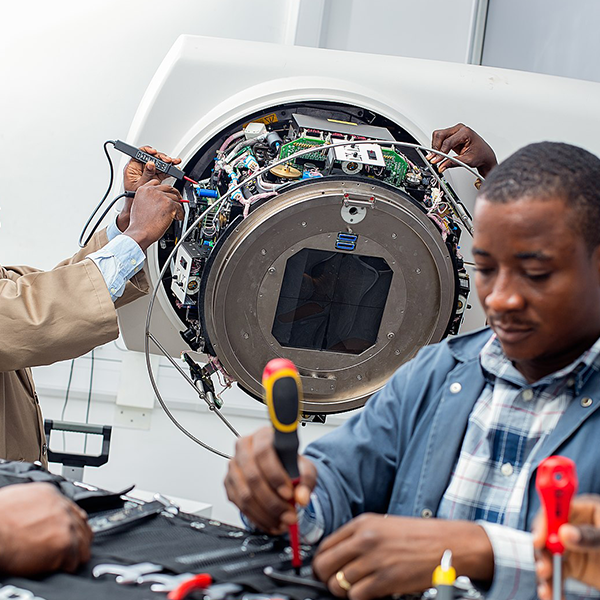Ashenafi Hussein
Medical device and technologies are imported segments of technologies in Africa. Huge amount of foreign currency (very limited resource) has been invested and is being invested for their acquisition in view of improving the quality of healthcare, education, scientific services and transfer of tacit knowledge and skill. However, the investment does not correspond to the outcome expected and the quality of healthcare services is not to the standard expected to be. With the same token scientific research outputs does not justify the investment; the quality of Clinical engineering education is in a debatable stage; scientific services are not supporting the export economy as required.
Reasons and challenges for above mentioned shaky performance are many. For instance, the world Health Organization (WHO 2010) estimates that less than half of all medical devices in developing countries is usable. Lack of professional educational institution, lack of training, capacity building, and lack of workshops, management and other infrastructure issues increase the challenges of the field. Africa, with increasing number of population, the problem is also increasing pertinent to Medical devices. What make the problem more complex is , the other health professionals ( pharmacists , lab technicians , doctors ) are working on medical devices than the existing clinical engineers/biomedical engineers. Due to lack of clinical engineering professionals, poor management of medical device, many African countries does not have the human resources to ensure proper healthcare technology management. In some countries of the sub-Saharan region as indicated in WHO Human Resource for Medical device ( WHO, 2017) the ratio of biomedical engineers in many African Countries is very low which shows the need for professionals and what actually exist do not match. Professional society formation and togetherness has somehow brought integration clinical engineers/biomedical engineers/medical equipment engineers like east Africa, southern Africa, and west part of Africa.
Why Focus on Africa
The need for professional in Biomedical and Clinical engineering in Africa is high .The name Clinical engineering, biomedical engineering, medical device maintenance engineers are interchangeable used in many African Countries since most activities are related to management and maintenance of medical devices.
Medical devices and health care technology are highly expanding along with the expansion and access to Healthcare in Africa. Despite the fact that there is expansion for service, the professional and technological advancement is not as high as as needed. Africa is one of the oldest and largest continents with population exceeding 1.37 billion . Few African countries have organized their national societies to enhance the field of biomedical and clinical engineering. With the advancement in technology on medical devices and the increase in need many biomedical engineers are graduating, and the profession is expanding quickly. Different African professional societies in different countries were created and there was a great demand to join IFMBE. With the Mission IFMBE has , working group on African activity (WGAA) was created in 2018 with South Africa, Nigeria already members. Kenya, Ghana, Ethiopia, Uganda, Benin have joined IFMBE in the same year. The number of members joining IFMBE is increasing with DRC , Rwanda joining and other countries like Burkina Faso, Cameroon, ivory coast, Egypt, Sudan, Burundi showing interest. Having as many as 54 countries in Africa, the number of countries joining IFMBE is increasing.
During Consecutive meeting held at different times and issues raised at WC2022 Singapore the need for the creation of Africa region as one region of IFMBE . Major points raised as to the creation of Africa regions were as follows
- Population and number of countries – As of 2021The population is estimated to be more than 1.37 billion and 54 countries , there need to be a region that can cope up with this big region Africa.
- The level of Biomedical Engineering in Africa is different from other regions –The development of the profession is increasing but not developed like Europe or USA .
- Health facility expansion – There is a high expansion of Hospitals , Health centers in Africa to meet the demand of the huge population . To have medical devices for all these health facilities we need professionals graduated and organized as a region.
- The number of societies is increasing and become to be member of IFMBE – There is a huge potential for IFMBE to have as many members as possible from the 54 countries in Africa. We have around 10 ( including those on the process ) which are members of IFMBE.
- Different language and potential expansion of the field – In Africa , With Africa Union approving Swahili as additional language, there were English, French, Arabic, Portuguese as official language, these will help for the expansion of the profession and to expand IFMBE with many countries and language.
Taking the above issues seriously , IFMBE has created Africa Region of IFMBE in the WC2022 Singapore. Such Decision is Historical , Strategical and meaningful in every aspect to the development of the professional. Africa is Huge, Africa has too many challenges with too many opportunities , Africa is the Future.
Image credits: https://commons.wikimedia.org/wiki/File:Ghanaian_Medical_Engineers.jpg

